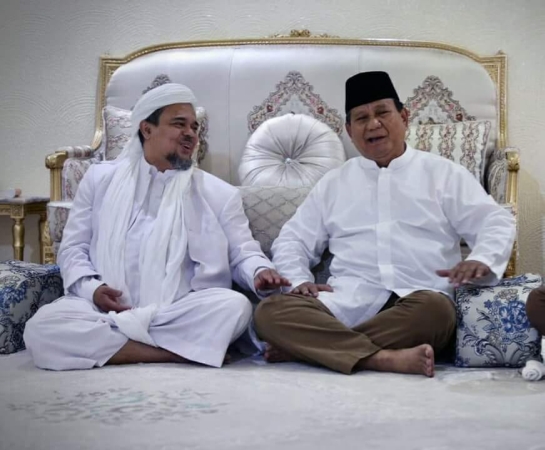Hope that divisive religious issues will not play a major role in Indonesia’s 2019 presidential election is dimming after opposition candidate Prabowo Subianto signed an “integrity pact” from a Islamic hardliner political group promising he would protect their interests and assure the safe return of one of the country’s most controversial religious figures should he win in April.
Yesterday, the Gerindra chairman attended the second Ijtima Ulama conference held by the National Movement to Guard the Ulama Fatwa (GNPF), a hardliner-affiliated political group originally started to organize the massive protests against former Jakarta Governor Basuki “Ahok” Tjahaja Purnama after a fatwa decreed he had committed blasphemy against Islam.
Since GNPF’s protests helped defeat Ahok in the 2017 Jakarta gubernatorial election, the group has tried to exert more political influence and, during their first Ijtima Ulama conference in July, they recommended that Prabowo chose a religious figure as his vice president, with their first choice being Rizieq Shihab, the fugitive firebrand cleric and founder of the Islamic Defenders Front (FPI).
Obviously, Prabowo did not go with any of GNPF’s recommendations, instead choosing former Jakarta vice governor and entrepreneur Sandiaga Uno in a surprise pick (one allegedly influenced by Sandiaga’s immense wealth). Despite being spurned, GNPF said they would still support the Prabowo-Sandiaga ticket as long as they committed to the “integrity pact” Prabowo signed at yesterday’s event.
“I, on behalf of presidential and vice-presidential candidates Prabowo Subianto and Sandiaga Uno, thank the second Ijtimak Ulama of the GNPF-Ulama for their trust in us, for their support, which is so sincerely given. This is really moving for me,” Prabowo said at the event as quoted by Detik. (Sandiaga, however, did not make an appearance at the conference.)
Out of the 17 points in the pact signed by Prabowo, most of them are vague promises about upholding the constitution, the state ideology of Pancasila, protecting the sanctity of Islam etc (#13 is a promise to “guarantee a decent life for every citizen to be able to realize their food, sovereignty, clothing and housing needs”, which sounds like a fairly socialist sentiment considering the group’s fiery anti-communist rhetoric).
But it’s point #16 of the pact that is by far the most specific and controversial. It says in part that if he wins, Prabowo would commit to “using the constitutional and attributive rights inherent in the position of president to carry out the rehabilitation process, ensure the safe return, and restore the rights of Habib Rizieq Shihab as an Indonesian citizen.”
Rizieq is currently still in Saudi Arabia, where he has spent more than a year hiding from Indonesian law enforcement. Although police dropped his suspect status in the infamous pornography case that first led him to flee and stay out of his country, the FPI leader still has numerous legal cases at various stages pending against him including charges of blasphemy against Christianity and state symbols.
Many thought that President Joko Widodo’s choice of Ma’ruf Amin, the currently non-active head of the Indonesian Ulema Council (MUI) and the person who signed the blasphemy fatwa against Ahok that gave GNPF its name, would make voter mobilization via Islamic hardliners an unviable strategy for Prabowo. While that remains to be seen, obviously Prabowo believes it’s still worth cozying up to these groups.
And to be fair, even the ruling PDI-P party of President Jokowi made overtures in that direction, with one party officials even going so far as to say they would be willing to accept Rizieq’s support for the incumbent with Ma’ruf acting as a bridge.
So while we’ll have to wait and see to find out how much religious issues will play into this election, at least we know that Rizieq Shihab likely won’t be coming back to Indonesia until at least after the election.




